Health workers in Yemen fight for the lives of COVID-19 patients
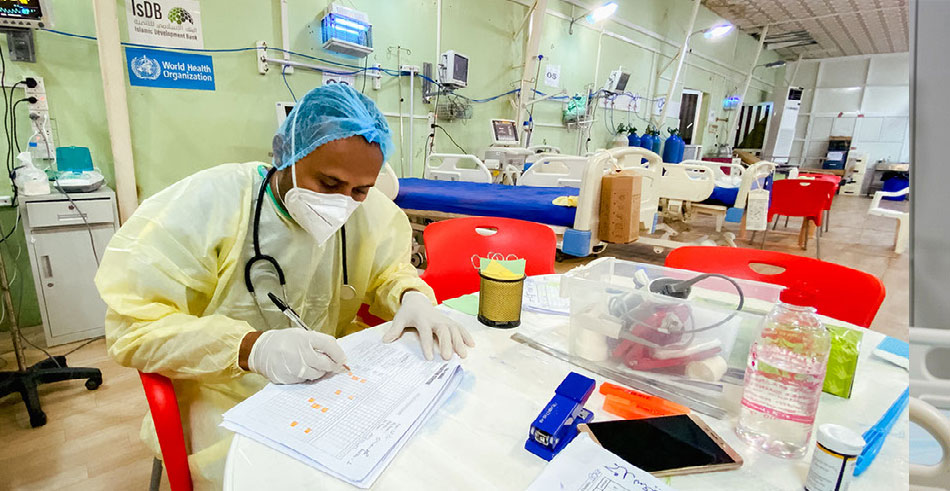
28 December 2021 - "Imagine becoming like family for a complete stranger, like everything they have in life and like their lifeline. During my work for the COVID-19 response, we work tirelessly to save the lives of these patients and offer them care and support in their fight against the disease," says Fadhl Ismail, a health worker in the Al Amal isolation centre in Aden since the first COVID-19 wave in March 2020.
After 19 years of waiting, Al-Sadaqah Hospital in Yemen has a new x-ray machine thanks to WHO and World Bank
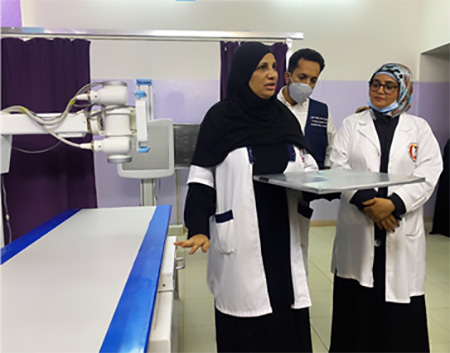 General Director of Al-Sadaqah Hospital Dr Kefaya Al-Gazaie, Manager of the Radiology Department Dhikra Abdulraheem and WHO Technical Officer Dr Amgad Abdulqawi discuss the impact that the new digital x-ray machine will have on the population of Aden and surrounding governoratesAden, 5 December 2021 – With the crisis in Yemen profoundly impacting the country's health system, WHO is strengthening service delivery at hospitals across the country through the World Bank-supported Emergency Health and Nutrition Project (EHNP). One such facility is Al-Sadaqah Hospital in Aden where, after 19 years of relying on an increasingly outdated and underperforming x-ray machine, the hospital staff finally received a new one.
General Director of Al-Sadaqah Hospital Dr Kefaya Al-Gazaie, Manager of the Radiology Department Dhikra Abdulraheem and WHO Technical Officer Dr Amgad Abdulqawi discuss the impact that the new digital x-ray machine will have on the population of Aden and surrounding governoratesAden, 5 December 2021 – With the crisis in Yemen profoundly impacting the country's health system, WHO is strengthening service delivery at hospitals across the country through the World Bank-supported Emergency Health and Nutrition Project (EHNP). One such facility is Al-Sadaqah Hospital in Aden where, after 19 years of relying on an increasingly outdated and underperforming x-ray machine, the hospital staff finally received a new one.
Hospitals in Yemen are struggling to meet the increasing demands for essential care, coupled with deteriorating infrastructure, equipment and services. "Since 2002, we had been working with another x-ray machine that insufficiently diagnosed cases, forcing many patients to go to an expensive private clinic,” said Dhikra Abdulraheem, Manager of the Hospital’s Radiology Department.
The state-of-the art, digital x-ray machine is already enabling the hospital’s pediatric department to better treat a growing influx of patients. “Now, instead of paying five times more at a private clinic, they can receive the same accurate diagnosis at a much more affordable cost,” added Abdulraheem.
Improved image diagnostic capacity will enable doctors to effectively detect severe acute lower respiratory tract infections, which will reduce the risk of infection-related mortality in children under five.
Abdulraheem elaborated that the machine will also diagnose adult cases, which is key to meeting the needs of an ever-growing number of patients -- including internally displaced people -- hailing from many different governorates. “We have suffered a long time, especially during the last four years of this seven-year conflict,” added Abdulraheem, “Now, thanks to the arrival of this new x-ray machine, we can finally treat more patients.”
COVID-19 treatment centres: the first line of defense in saving Yemeni lives
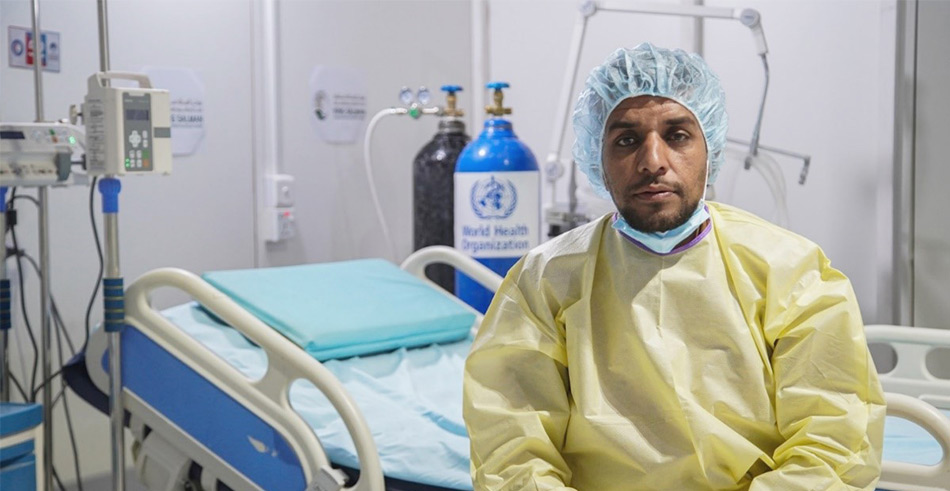
15 December 2021 - Thirty-eight-year-old Wajdi Sweidan, a lab technician at Tarim Hospital, in Hadramout, contracted COVID-19 while he was taking samples from a patient. After recovering, his family tried to convince him to stop working at the centre, but he was determined to help patients get through the “harshest illness” he has ever experienced.
Amid the conflict in Yemen, mass campaigns to end the threat of tropical diseases continue
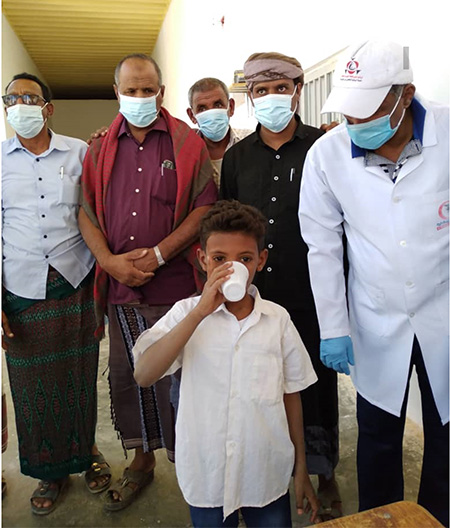 14 December 2021 –- Schistosomiasis and soil-transmitted helminths are neglected tropical diseases (NTDs), but these parasitic worm infections can lead to anaemia, malnutrition, and learning difficulties among children. Left untreated, schistosomiasis can damage the liver, intestines, bladder, spleen and lungs, while soil-transmitted helminths can cause a range of problems, including slow physical and mental development.
14 December 2021 –- Schistosomiasis and soil-transmitted helminths are neglected tropical diseases (NTDs), but these parasitic worm infections can lead to anaemia, malnutrition, and learning difficulties among children. Left untreated, schistosomiasis can damage the liver, intestines, bladder, spleen and lungs, while soil-transmitted helminths can cause a range of problems, including slow physical and mental development.
Public health authorities have battled for more than a decade to tackle schistosomiasis, supported by partners such as the World Bank’s International Development Association (IDA) and World Health Organization (WHO). In 2010, one in five residents in Yemen is at risk of contracting schistosomiasis, better known as bilharzia. Today, this figure has dropped to fewer than one in 15 (about three million people). Although limited data exist on the soil-transmitted helminths that affect communities across the country, bringing these infections under control is another public health goal.
Eliminating schistosomiasis involves the mass administration of drugs, with members of a target population being treated once a year. Several rounds of drugs are administered over several years to get rid of a community of the parasite. The Emergency Health and Nutrition Project (EHNP) funded by IDA, the World Bank’s fund for poorest countries, has helped to eliminate schistosomiasis as a public health problem in Yemen.
“Nothing beats a child’s smile. This project represents a critical opportunity to decrease the disease burden among vulnerable Yemenis, particularly children. The project is part of the World Bank’s strategy to invest in Yemen’s most important assets: its people,” said Tania Meyer, World Bank Country Manager for Yemen.
During a recent four-day mass campaign, almost 860 000 children and adolescents between six and 19 years of age, were targeted (whether enrolled in school or not) across seven southern and eastern governorates: Abyan, Hadramout/Mukalla, Hadramout/Sayoun, Lahj, Mareb, Shabwa, and Taiz. In total, 37 districts, 373 team leaders, 1070 team supervisors, and 2140 drug distributors were involved and over 80% of the target population reached.
Yemen is making progress against other neglected tropical diseases as well. Lymphatic filariasis, which causes swelling of limbs and is spread by infected mosquitos, was eliminated as a public health problem in 2019. The administrative certification of the elimination of leprosy in Yemen is underway, and technical teams are working hard to eliminate blindness of infectious origins: trachoma by 2024, and onchocerciasis, or river blindness, by 2030.
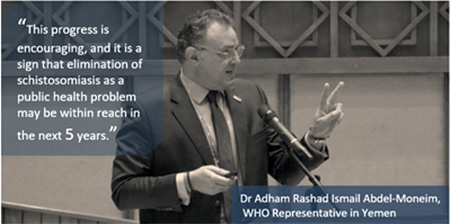 “This progress is encouraging, and a sign that the elimination of schistosomiasis as a public health problem may be within reach in Yemen in the next five years,” said Dr Adham Rashad Ismail Abdel-Moneim, WHO’s Yemen Representative. “Reaching it, however, will depend on continued support from partners.”
“This progress is encouraging, and a sign that the elimination of schistosomiasis as a public health problem may be within reach in Yemen in the next five years,” said Dr Adham Rashad Ismail Abdel-Moneim, WHO’s Yemen Representative. “Reaching it, however, will depend on continued support from partners.”
The campaign was carried out in close collaboration with Yemen’s Ministry of Education and the Health Education Centre, which is part of the Ministry of Public Health and Population. Technical and statistical local plans were prepared, a training of trainers’ session carried out, and workshops given to drug distributors and the heads of teams in charge of both fixed and mobile treatment facilities. A third-party team conducted direct monitoring of the activities and interviews with around 4000 people across 1000 randomly selected households.
The campaign in January 2021 targeted 2.4 million people at 3300 sites across 32 districts in seven northern governorates, involving 6700 drug distributors. Approximately, 4.8 million praziquantel tablets and 2.4 million albendazole tablets were distributed.
More mass campaigns against soil-transmitted helminths and schistosomiasis are planned for 2022, with more investment made to improve community engagement in order to reach more than 80% of the targeted population in the future.
Related link
The Enemy Within: Tackling Schistosomiasis in Yemen, World Bank, 7 April 2014








